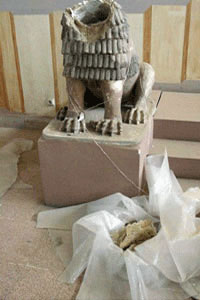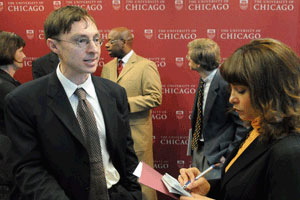Chicago in the News
The Chronicle’s biweekly column Chicago In the News offers a digest of commentary and quotations by a few of the University faculty members, students and alumni who have been headlining the news in recent weeks. Chicago faculty members are some of the most frequently quoted experts, so space allows publishing references to only selected examples. To read many of the full newspaper articles mentioned in this column, visit the In the News column at the University News Office Web site: http://www-news.uchicago.edu.
Jens Ludwig speaks with reporters. |
|
Partners against crime
A new research partnership between the City of Chicago and the University to examine gun violence in Chicago was announced Thursday, April 10. The new study was the subject of media coverage Thursday, April 10 and Friday, April 11 by WLS-TV ABC News in Chicago, the Chicago Sun-Times, the Associated Press and the Chicago Tribune, which all reported on the announcement from Mayor Richard Daley at the University’s School of Social Service Administration. Jens Ludwig, Professor of Social Service Administration, Law and Public Policy, who will lead the study, said in the Chicago Sun-Times: “Really understanding what’s going on with people who are coming out of detention—that’s juvenile and young adults as well—has to be an important part of the story to steer people away from the types of activities that put them at risk of both shooting as well as getting shot.”
Friedman’s influence carries on
Alumnus Masaaki Shirakawa (A.M.,’77) was featured in several newspapers Thursday, April 10, including the Chicago Tribune, which reported his confirmation as the Bank of Japan’s new governor. The article noted Shirakawa’s University degree and his Chicago School of Economics training. Shirakawa got his master’s degree in economics in 1977, when Milton Friedman was a dominant presence at the University, the article noted. What Shirakawa brings to his new job from his school days is a recognition that well-functioning markets are at the heart of a well-functioning economy, said Jacob Frenkel, one of his former Chicago professors, in the article.
Advancing asthma research
Genetic research conducted at the University—in which a gene variant was found to be responsible for an increased risk for asthma, bronchial hyper-responsiveness and a decline in lung function—was published in the Thaindian News, a publication in Bangkok, Thailand. Carole Ober, Professor in Human Genetics and the College, and lead author of the study, which was published in the New England Journal of Medicine, said the discovery of the variant is exciting because it connects asthma susceptibility to a new pathway at the protein and genetic levels. “This is also the most significant genetic discovery based on our years of gathering data on asthma in the Hutterites. This is a group with enormous potential to advance our understanding of the genetic underpinnings of disease. We now have a remarkable collection of data, which we expect will lead us to many more insights.” The Associated Press also carried an article about the genetic discovery on its newswire Friday, April 11.
Stolen history
 The remains of a damaged terra cotta statue of a lion (ca. 1800 B.C.). |
|
Stories about the new exhibition, “Catastrophe! The Looting and Destruction of Iraq’s Past,” at the Oriental Institute Museum, appeared in multiple publications and were carried by the Associated Press and Canadian Press newswires. The damage to archives at the National Museum of Iraq in Baghdad and the loss of stolen artifacts are central to the exhibition, which includes documents and photographs that show the destruction of archaeological sites in other regions of Iraq. Geoff Emberling, Director of the Oriental Institute Museum, noted in a Chicago Sun-Times story that thieves have destroyed many sites. “Holes are 10-feet deep. It’s like the surface of the moon,” he said.
Professor steps into ring
Aiyesha Dey, Assistant Professor of Accounting in the Graduate School of Business, was featured in the Sunday, April 6 Chicago Tribune for the fighting sport she takes up at the end of her teaching day. The article noted that Dey, who started boxing for adventure and exercise, stretches the image of a boxer. “I used to see boxing matches on TV, and I just thought, ‘Oh, people just beat each other up. Why would anyone do it?’ But I think there’s so much to it, once you do it you realize there’s strategy involved and footwork and you analyze your opponent … I’ve grown to respect it a lot.”
‘Culture of affluence’
Susan Mayer, Dean of the Irving B. Harris School of Public Policy Studies, was quoted in a Monday, April 7 Newsweek article. The author compared the financial damage done to America by today’s elite “overclass” with the economic impact of the self-destructive behaviors of the underclass—often referred to as the “culture of poverty.” He argued that “the pernicious culture of affluence merits further study.” Said Mayer: “Poor inner-city kids selling drugs to suburban kids can harm people. But financial markets can bring thousands and thousands of people to ruin.” The article also mentioned University alumnus Sudhir Venkatesh, who immersed himself in the “culture of poverty” for research, which was recently published in his book, Gang Leader for a Day. “If he really wants to understand the workings of the dysfunctional class that’s threatening American values and taxing national resources, Venkatesh, who teaches at Columbia, should move into a co-op on the Upper East Side and get a job on Morgan Stanley’s trading desk. He can call it ‘Hedge-Fund Manager for a Day.’ ”
South Side support
James Madara, C.E.O. of the University of Chicago Medical Center, Dean of the Biological Sciences Division and the Pritzker School of Medicine, and Vice President for Medical Affairs, was interviewed for a story published Monday, March 31 in Crain’s Chicago Business. The article reported the University Medical Center is funding the expansion of Access Community Health Center, a South Side clinic, to help treat a rising number of poor patients in need of routine health care. “We were just passively taking care of whatever showed up at our door when they were things that could be handled by community hospitals. We were eroding their base business while also making it more difficult on ourselves to serve our unique function,” said Madara.
![[Chronicle]](/images/sidebar_header_oct06.gif)
